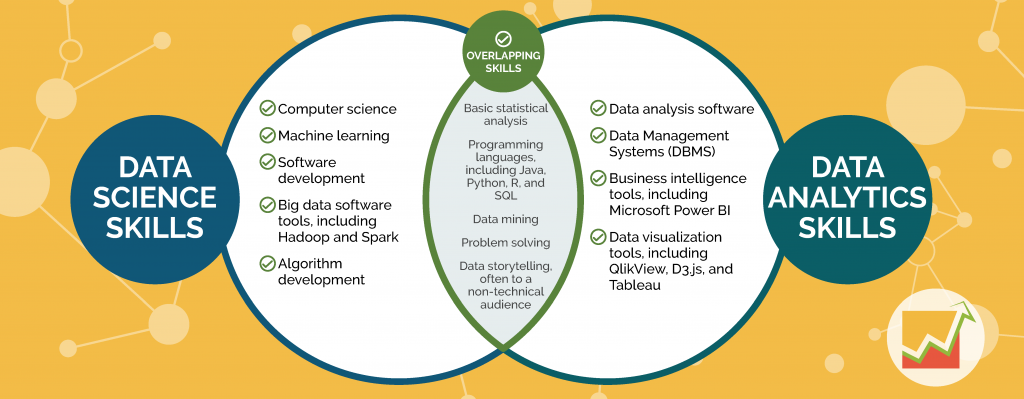As the world accelerates toward an era dominated by artificial intelligence (AI) and digital transformation, staying relevant in your career requires continuous learning, adaptability, and embracing new technologies. The landscape of work is shifting rapidly, with AI reshaping industries and jobs that were once considered secure. The key to maintaining your value in this evolving environment lies in mastering new skills, understanding digital trends, and being proactive in adopting innovative technologies. Whether you are an established professional or just entering the workforce, here’s what you need to study and do to stay ahead in the age of AI and digital transformation.
1. Embrace Data Science and Analytics

Data is the backbone of digital transformation, and mastering data science and analytics is one of the most valuable skills you can acquire today. As businesses increasingly rely on data-driven decisions, the demand for professionals who can interpret and analyze data is surging. Whether you’re in marketing, finance, or healthcare, understanding how to work with data is essential.
Begin by learning the basics of statistics and data analysis, and then move on to specialized tools like Python, R, and SQL. Understanding machine learning algorithms, data visualization techniques, and predictive analytics will make you an indispensable asset in any organization. Courses and certifications in data science from platforms like Coursera, edX, or DataCamp can help you get started and stay up-to-date with the latest trends.
2. Master Artificial Intelligence (AI) and Machine Learning
Artificial Intelligence (AI) is revolutionizing industries from healthcare to manufacturing, and professionals with expertise in AI and machine learning (ML) are in high demand. AI is at the core of digital transformation, with applications in automation, predictive analytics, natural language processing, and more. To stay relevant, it’s crucial to understand AI and its potential applications in your field.
Start by familiarizing yourself with the fundamentals of AI, such as neural networks, deep learning, and reinforcement learning. As you progress, explore more advanced topics like computer vision, robotics, and natural language processing. Many online resources, including AI-related courses and boot camps, offer in-depth knowledge to help you develop AI skills. Google’s AI and ML resources or MIT’s AI courses are excellent places to begin your learning journey.
3. Enhance Your Digital Literacy
In the digital age, digital literacy goes beyond basic computer skills. It encompasses a deep understanding of how technology works and its impact on business and society. Professionals who can navigate digital tools and platforms, from cloud computing to cybersecurity, are essential to every organization’s success in the age of AI.
To stay relevant, it’s important to develop proficiency in key digital tools that align with your industry. For example, learning about cloud services like Amazon Web Services (AWS) or Microsoft Azure, and cybersecurity protocols will help protect businesses from digital threats. Digital literacy also includes staying updated on the latest software tools, productivity applications, and project management systems that streamline workflow and collaboration.
4. Cultivate Soft Skills: Creativity, Adaptability, and Problem-Solving
While technical skills are crucial, soft skills are equally important in the age of AI and digital transformation. AI can automate many tasks, but it cannot replace human creativity, emotional intelligence, and problem-solving capabilities. Therefore, professionals who can combine technical expertise with strong interpersonal and creative skills will remain valuable assets.
To develop these skills, engage in creative activities like brainstorming sessions, innovation challenges, or participating in cross-functional team projects. Adaptability is key to surviving and thriving in a constantly changing environment, so embrace change and learn to pivot when necessary. Problem-solving and critical thinking are also essential, so seek opportunities to tackle complex challenges and find solutions that add value to your organization.
5. Focus on Cybersecurity
As digital transformation continues, the threat of cyberattacks increases. With sensitive data being stored and shared online, cybersecurity is a top priority for businesses worldwide. By gaining expertise in cybersecurity, you can play a critical role in protecting organizations from digital threats and data breaches.
Start by learning the fundamentals of cybersecurity, including encryption, firewall protection, risk management, and ethical hacking. You can find cybersecurity courses through platforms like Cybrary, Udemy, and LinkedIn Learning. Gaining certifications such as Certified Information Systems Security Professional (CISSP) or Certified Ethical Hacker (CEH) can significantly enhance your career prospects and make you a valuable asset in the age of digital transformation.
6. Learn Automation Tools
Automation is one of the biggest driving forces behind digital transformation, and businesses are increasingly relying on automated processes to streamline their operations. From automating customer support with chatbots to automating marketing campaigns, the need for automation skills is growing across industries.
To stay relevant, start learning about tools that help automate various business functions. For example, tools like Zapier, Microsoft Power Automate, and UiPath are popular for automating workflows in marketing, sales, and operations. By mastering these tools, you’ll be able to optimize processes, reduce manual tasks, and improve efficiency—skills that are highly valued in the workforce.
7. Develop Project Management and Agile Skills
In the digital age, project management is no longer just about overseeing timelines and deliverables; it’s about navigating complex projects in fast-paced, evolving environments. Learning how to manage digital transformation projects using Agile or Scrum methodologies is critical to staying relevant.
Agile project management is designed to be flexible and iterative, making it ideal for the ever-changing demands of digital transformation. By acquiring knowledge in Agile frameworks, you can help organizations adapt to shifts in market trends and technological innovations. Enrolling in Agile or Scrum certifications, such as Certified ScrumMaster (CSM) or Agile Project Management (APM), can significantly improve your employability and provide you with the tools needed to manage digital transformation projects successfully.
8. Stay Up-to-Date with Emerging Technologies
The rapid pace of technological advancements means that staying relevant requires a proactive approach to learning about emerging technologies. These technologies include blockchain, augmented reality (AR), virtual reality (VR), and 5G, all of which are shaping industries and creating new opportunities.

Keep yourself updated by subscribing to tech blogs, attending webinars, and joining online communities. Sites like TechCrunch, Wired, and MIT Technology Review offer insightful articles on emerging trends. Participating in industry conferences, hackathons, and workshops also provides opportunities to learn from experts and gain hands-on experience with the latest tech developments.
9. Strengthen Communication Skills
In an increasingly digital world, strong communication skills are more important than ever. As teams become more distributed and remote, effective communication becomes the cornerstone of collaboration. Being able to clearly convey ideas, whether through written communication, virtual meetings, or presentations, is essential in the digital workplace.
Take steps to improve your communication skills by practicing writing clear and concise emails, delivering compelling presentations, and engaging in active listening. Use online tools such as Grammarly to refine your written communication, and participate in virtual networking events to hone your verbal communication skills.
10. Foster a Growth Mindset
Finally, adopting a growth mindset is perhaps the most important step to staying relevant in the age of AI and digital transformation. A growth mindset enables you to see challenges as opportunities for learning and growth rather than obstacles. This mindset is vital when navigating rapid technological advancements and shifting job markets.
Cultivate a growth mindset by being open to new ideas, seeking feedback, and continuously learning. Take on new projects that push you outside your comfort zone and view failures as opportunities to improve. By focusing on personal and professional development, you can remain adaptable and resilient in the face of change.
Conclusion
Staying relevant in the age of AI and digital transformation requires a commitment to lifelong learning, adapting to new technologies, and developing both technical and soft skills. By mastering emerging technologies, enhancing your digital literacy, and honing your problem-solving and communication abilities, you can future-proof your career. The key is to stay curious, embrace change, and always be ready to learn and grow in this fast-evolving digital landscape. With the right mindset and skills, you’ll be well-equipped to thrive in the age of AI and digital transformation.

Leave a Reply